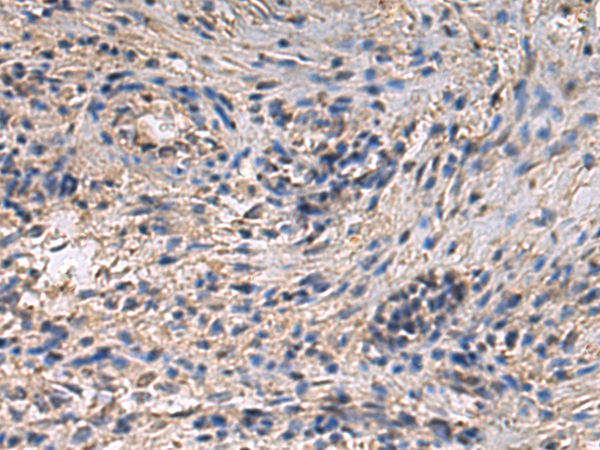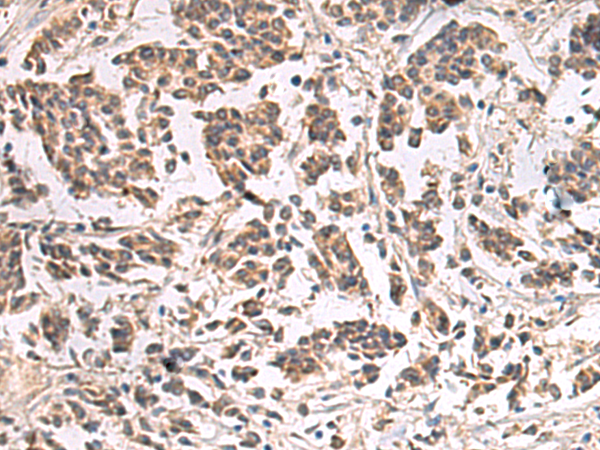

| WB | 咨询技术 | Human,Mouse,Rat |
| IF | 咨询技术 | Human,Mouse,Rat |
| IHC | 1/50-1/100 | Human,Mouse,Rat |
| ICC | 技术咨询 | Human,Mouse,Rat |
| FCM | 咨询技术 | Human,Mouse,Rat |
| Elisa | 1/5000-1/10000 | Human,Mouse,Rat |
| Host/Isotype | Rabbit IgG |
| Antibody Type | Primary antibody |
| Storage | Store at 4°C short term. Aliquot and store at -20°C long term. Avoid freeze/thaw cycles. |
| Species Reactivity | Human, Mouse |
| Immunogen | Synthetic peptide of human GNG3 |
| Formulation | Purified antibody in PBS with 0.05% sodium azide and 50% glycerol. |
+ +
以下是3篇涉及GNG3抗体的文献摘要信息,供参考:
---
**1. 文献名称**: "GNG3 overexpression correlates with poor prognosis and promotes cell proliferation in hepatocellular carcinoma"
**作者**: Li Y, et al.
**摘要**: 该研究通过免疫组化(使用GNG3抗体)和Western blot分析发现,GNG3在肝细胞癌组织中高表达,并与患者预后不良相关。实验表明,GNG3通过激活MAPK/ERK通路促进癌细胞增殖,提示其作为肝癌潜在治疗靶点的可能性。
---
**2. 文献名称**: "G-protein subunit gamma 3 (GNG3) is a potential regulator of adipogenesis"
**作者**: Zhang H, et al.
**摘要**: 研究利用GNG3特异性抗体在小鼠脂肪细胞模型中检测蛋白表达,发现GNG3通过调控AMPK信号通路抑制脂肪生成。敲低GNG3导致脂肪细胞分化增强,表明其在代谢性疾病中的潜在作用。
---
**3. 文献名称**: "Characterization of GNG3 antibody specificity in neurological disorders"
**作者**: Smith JL, et al.
**摘要**: 本研究验证了一种商业化GNG3抗体的特异性,发现其在大脑组织样本中可特异性识别GNG3蛋白,且与阿尔茨海默病患者脑组织的神经炎症标志物共定位,提示GNG3可能参与神经退行性病变过程。
---
**备注**:若需更具体的研究方向(如癌症、神经科学等)或实验技术(如ChIP-seq、流式细胞术),建议补充关键词以缩小检索范围。部分文献可能需要通过PubMed或ResearchGate等平台获取全文。
The GNG3 antibody is a research tool designed to detect and study the G protein subunit gamma 3 (GNG3), a component of heterotrimeric G proteins involved in intracellular signaling pathways. G proteins, composed of α, β, and γ subunits, mediate signal transduction from G protein-coupled receptors (GPCRs) to downstream effectors. GNG3 specifically belongs to the γ-subunit family, which plays a critical role in modulating the specificity and efficiency of GPCR signaling by influencing interactions between Gβγ complexes and target molecules.
GNG3 is expressed in various tissues, including the brain, liver, and heart, and has been implicated in processes such as neurotransmission, cell differentiation, and metabolic regulation. Antibodies targeting GNG3 are widely used in techniques like Western blotting, immunohistochemistry, and immunofluorescence to investigate its expression patterns, localization, and functional roles in physiological and pathological contexts.
Research utilizing GNG3 antibodies has contributed to understanding its association with diseases, including cancers (e.g., glioblastoma, hepatocellular carcinoma) and neurological disorders, where dysregulated G protein signaling is often observed. These antibodies are essential for elucidating molecular mechanisms involving GNG3 and validating its potential as a therapeutic or diagnostic target. Validation of antibody specificity, through methods like knockout controls or siRNA knockdown, is crucial to ensure reliable experimental outcomes.
×